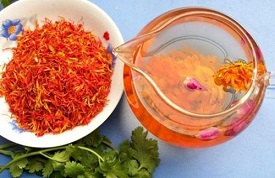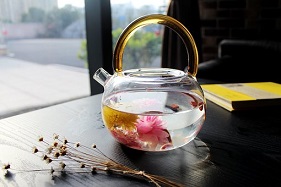The majority of the blocked fallopian tube cases are caused by inflammation, and pelvic inflammatory disease is one of the leading causes. Improper operations of induced abortions and drug abortions, or postoperative infection after childbirth, or untreated gynecological inflammation, all of these situations might be likely to infect the pelvic cavity and fallopian tube, leading to adhesion and
blocked fallopian tubes.
In addition, due to the blockage of the fallopian tube, the local blood circulation is not smooth, so the patients will have congestion dysmenorrhea, so some tea with the effect of promoting blood circulation and removing stasis and anti-bacterial and anti-inflammatory will have a certain auxiliary treatment effect for the patients with fallopian tube blockage.
1. Safflower tea
According to traditional Chinese medicine, safflower has the functions of promoting blood circulation, relieving pain, accelerating metabolism, etc. it is suitable for women with amenorrhea, dysmenorrhea and various blood-stasis pain. Due to the effects of promoting blood circulation and removing blood stasis, anti-bacterial and anti-inflammatory, it can enhance the immune function, now it has been widely used in clinical medicine and can treat various chronic diseases.
However, it should be noted that long-term use of safflower will cause serious damage to the nervous system, urinary system and digestive system, accompanied by adverse reactions such as skin allergy and anaphylactic shock.
2. Rose Tea
Rose tea contains a variety of vitamins, organic acids, sugars and volatile aroma components. It has a mild property, can promote blood circulation, dredge meridians, improve endocrine disorders, eliminate siltation, reduce blood pressure. Besides, it has the effect of clearing away heat and detoxification, which is very effective in preventing a variety of infections, such as gynecological inflammation.
At the same time, the fragrance of rose has the effect of calming the nerves to a certain extent, which is also good for relieving dysmenorrhea.Tips:women with heavy bleeding or regular periods should not drink rose tea during periods.
3. Green tea
Green tea is a kind of non-fermented tea, which is rich in tea polyphenols, catechins, chlorophyll, caffeine and other substances. These ingredients play a key role in sterilization, anti-inflammatory, and other effects, and it is difficult for other tea to have such rich content. Relevant clinical experiments show that tea polyphenols have a strong convergence effect, can inhibit and kill bacteria, and have a significant anti-inflammatory effect.





